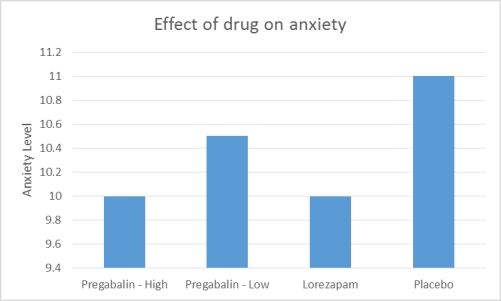Use the following to answer questions
Scenario I
Scenario I is based on fabricated data inspired by the following study:
Pande, A. C., Crockatt, J. C., Feltner, D. E., et al. (2003) . Pregabalin in generalized anxiety disorder: a placebo-controlled trial. The American Journal of Psychiatry, 160(3) , 533-540.
Effect of Pregabalin on Anxiety
Pande and colleagues examined whether pregabalin (brand name Lyrica) was as effective as lorazepam (brand name Ativan) in treating anxiety. To that end, they administered either a low dose of pregabalin, a high dose of pregabalin, lorazepam, or placebo to participants for four weeks, then measured the participants' anxiety using the Hamilton Anxiety Rating Scale. The researchers found that not only did the high dose of pregabalin significantly reduce anxiety, but that it also reduced anxiety as well as lorazepam. The results of the study (Figure 1) indicate that pregabalin may be an effective alternative to lorazepam to treat anxiety in adults.
 Figure 1. Hypothetical results of Pande et al (2003) showing the impact of each treatment on anxiety level. Anxiety was measured using the Hamilton Anxiety Rating Scale.
Figure 1. Hypothetical results of Pande et al (2003) showing the impact of each treatment on anxiety level. Anxiety was measured using the Hamilton Anxiety Rating Scale.
-(Scenario I) Which of the following is an ethical issue apparent in Figure 1?
Definitions:
Clinical Researcher
A professional involved in conducting scientific studies to evaluate and improve healthcare interventions, diagnostics, and treatments.
Efficacy
The ability to produce a desired or intended result, often used in the context of medicine to describe the effectiveness of a treatment.
Longitudinal Study
An observational research method in which data is gathered for the same subjects repeatedly over a period of time.
Developmental Trends
Patterns and sequences of development observed over time, which can include physical, cognitive, and social changes.
Q3: A famous psychologist who was known for
Q6: What is the difference between confidentiality and
Q9: List and describe three characteristics of a
Q20: _ is a part of the standard
Q27: The representativeness heuristic is a strategy for:<br>A)
Q31: What does "massaging the data" mean?<br>A) falsifying
Q86: (Scenario I) Suppose the researchers still measured
Q118: Your research program yields a significant finding
Q126: _ is to typical as _ is
Q138: Which of the following is NOT a